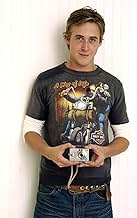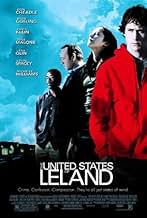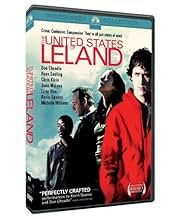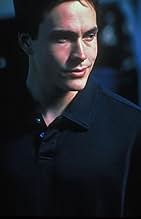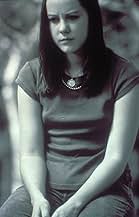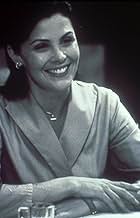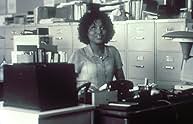Die Erfahrung eines jungen Mannes in einer Jugendstrafanstalt berührt die stürmischen Veränderungen, die seine Familie und die Gemeinschaft, in der er lebt, betreffen.Die Erfahrung eines jungen Mannes in einer Jugendstrafanstalt berührt die stürmischen Veränderungen, die seine Familie und die Gemeinschaft, in der er lebt, betreffen.Die Erfahrung eines jungen Mannes in einer Jugendstrafanstalt berührt die stürmischen Veränderungen, die seine Familie und die Gemeinschaft, in der er lebt, betreffen.
- Auszeichnungen
- 1 Gewinn & 2 Nominierungen
Handlung
WUSSTEST DU SCHON:
- WissenswertesA recurring element of the film is the fact that Leland doesn't have any contact with his father, absent ever since his childhood. Ryan Gosling never shares any scenes with Kevin Spacey and in the courtroom sequence, even though both characters are present, they're never in the same frame.
- PatzerIn this movie, set in Arizona, all the cars shown have front and back license plates. However, in Arizona you are only issued two license plates if you have a personalized plate which none of the cars in the movie had.
- Zitate
Leland: It covers my eyes. It's all I can see. Say there's some kids playing baseball. All I see is the one kid they won't let play because he tells corny jokes. And no-one thinks they're funny. Or I see a boy and a girl in love and kissing, you know. I just see that they're gonna be one of those sad old couples one day who just cheats on each other and can't even look at each other in the eye. And I feel it. I feel all of their sadness. I feel it probably even worse than that sad old couple or that corny kid will ever feel it.
- VerbindungenFeatured in Anatomy of a Scene: The United States of Leland (2004)
- SoundtracksGigantic
Written by Frank Black (as Black Francis) and Kim Deal
Performed by Pixies (as The Pixies)
Copyright 1988 Rice and Beans Music (BMI)
Used by permission. All rights reserved.
Courtesy of Elektra Entertainment Group/4AD
By Arrangement with Warner Special Products
This is a movie that never decides where it's going and never develops a pulse. It's ill conceived in a whole list of ways. Leland is in special custody for committing this terrible, inexplicable crime which his fellow inmates consider so evil they call him `Devil Boy.' Yet he is portrayed as a young philosopher, a mild-mannered (if potentially lethal) Holden Caulfield. The disconnect is never explained. The movie purports to be exploring Leland's motives for the killing but it never finds any.
The tension is diffused by telling the story out of order with intercut scenes that build up our knowledge of subsidiary characters like Leland's mean, famous writer father (Kevin Spacey), his mother (Lena Olin), his girlfriend Becky (Jena Malone) ), his girlfriend's little brother and sister and parents, a young guy who lives with them (Chris Klein) and. . . and. . . Hoge doesn't know where to stop.
These subplots weaken all the characterizations, not just the central one, and they rob the movie of any point. Hoge is so interested in the career and love problems of Leland's prison teacher and would-be biographer, Pearl (Don Cheadle), in Leland's nasty, remote dad, in the dilemma of Chris Klein's character, and in Leland's girlfriend's drug issues, that the mystery of Leland and his crime never gets plumbed, even if Hoge knew how to do that, which he doesn't seem to.
Is Leland some kind of perverted saint, or just a mild-mannered psychopath? We never find out. All we know is he has come to look on the world as very sad, and that's the best explanation we get for the crime: he wanted to save the little boy from sorrow.
At one point confused, vague flashbacks about trips when Leland was supposed to visit his father in Paris but wound up in New York reveal yet another subplot as he's semi-adopted by a well off Manhattan family.
This all seems either ludicrous or crazy. If it strikes you as sensitive and deep, maybe you'd better check your own pulse.
Autism advocates are up in arms at the suggestion that Leland's killing of an autistic boy might be merciful, but this is not a portrait of the autistic boy -- who's only glimpsed a few times, or of the crime (ditto). What's even more reprehensible than the slighting of the boy is the suggestion that murder might be seen merely as an expression of teenage angst. The thinking behind this movie doesn't bear looking into, and if you want to demonstrate against every badly written film you're going to be awfully busy.
Another interesting contrast is to compare "The United States of Leland" with Jordan Melamed's `Manic,' where Don Cheadle plays a very similar role as a psychiatrist dealing with a disturbed youth named Lyle (Joseph Gordon-Levitt) who's killed a child in a fit of rage. `Manic' depicts in concrete terms where Lyle's rage comes from. We understand the rage is going to be a lifelong problem, but that with luck he may learn to tame it. There's no nonsense about the sorrow of the world and there aren't a lot of confusing subplots. `Manic," in fact, may be almost too simple, but it fairly bristles with powerful, authentic emotion. The story moves forward with intensity and the performances really sing.
Gosling doesn't shake our faith in his skill as an actor, and Cheadle, Klein, Spacey, and the other principals all do respectable, occasionally fine work, but they can't compensate for how badly this movie is conceived, written, and edited.
- Chris Knipp
- 15. Apr. 2004
- Permalink
Top-Auswahl
- How long is The United States of Leland?Powered by Alexa
Details
- Erscheinungsdatum
- Herkunftsland
- Offizieller Standort
- Sprache
- Auch bekannt als
- 20 Messerstiche
- Drehorte
- Produktionsfirmen
- Weitere beteiligte Unternehmen bei IMDbPro anzeigen
Box Office
- Bruttoertrag in den USA und Kanada
- 343.847 $
- Eröffnungswochenende in den USA und in Kanada
- 48.384 $
- 4. Apr. 2004
- Weltweiter Bruttoertrag
- 343.847 $
- Laufzeit1 Stunde 48 Minuten
- Farbe
- Sound-Mix
- Seitenverhältnis
- 1.85 : 1
Zu dieser Seite beitragen








